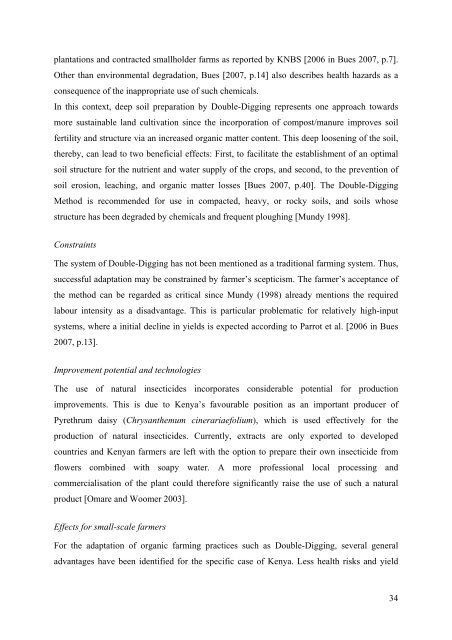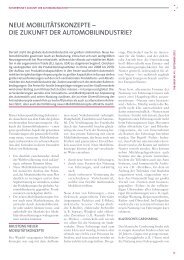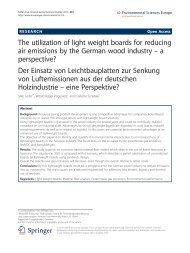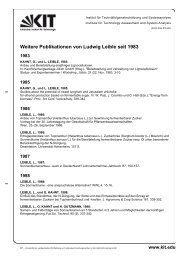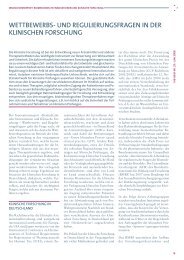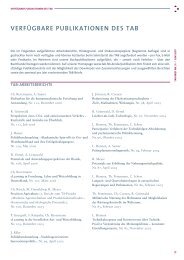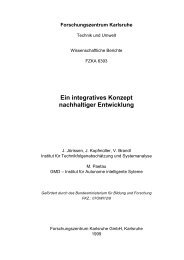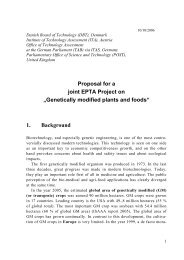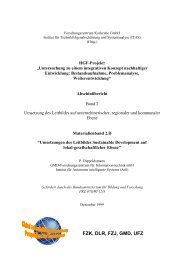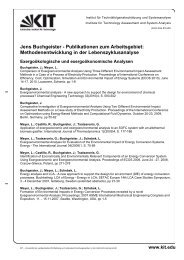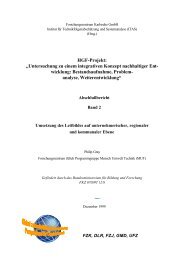Annex 4: Case study âOrganic Farmingâ - ITAS
Annex 4: Case study âOrganic Farmingâ - ITAS
Annex 4: Case study âOrganic Farmingâ - ITAS
You also want an ePaper? Increase the reach of your titles
YUMPU automatically turns print PDFs into web optimized ePapers that Google loves.
plantations and contracted smallholder farms as reported by KNBS [2006 in Bues 2007, p.7].<br />
Other than environmental degradation, Bues [2007, p.14] also describes health hazards as a<br />
consequence of the inappropriate use of such chemicals.<br />
In this context, deep soil preparation by Double-Digging represents one approach towards<br />
more sustainable land cultivation since the incorporation of compost/manure improves soil<br />
fertility and structure via an increased organic matter content. This deep loosening of the soil,<br />
thereby, can lead to two beneficial effects: First, to facilitate the establishment of an optimal<br />
soil structure for the nutrient and water supply of the crops, and second, to the prevention of<br />
soil erosion, leaching, and organic matter losses [Bues 2007, p.40]. The Double-Digging<br />
Method is recommended for use in compacted, heavy, or rocky soils, and soils whose<br />
structure has been degraded by chemicals and frequent ploughing [Mundy 1998].<br />
Constraints<br />
The system of Double-Digging has not been mentioned as a traditional farming system. Thus,<br />
successful adaptation may be constrained by farmer’s scepticism. The farmer’s acceptance of<br />
the method can be regarded as critical since Mundy (1998) already mentions the required<br />
labour intensity as a disadvantage. This is particular problematic for relatively high-input<br />
systems, where a initial decline in yields is expected according to Parrot et al. [2006 in Bues<br />
2007, p.13].<br />
Improvement potential and technologies<br />
The use of natural insecticides incorporates considerable potential for production<br />
improvements. This is due to Kenya’s favourable position as an important producer of<br />
Pyrethrum daisy (Chrysanthemum cinerariaefolium), which is used effectively for the<br />
production of natural insecticides. Currently, extracts are only exported to developed<br />
countries and Kenyan farmers are left with the option to prepare their own insecticide from<br />
flowers combined with soapy water. A more professional local processing and<br />
commercialisation of the plant could therefore significantly raise the use of such a natural<br />
product [Omare and Woomer 2003].<br />
Effects for small-scale farmers<br />
For the adaptation of organic farming practices such as Double-Digging, several general<br />
advantages have been identified for the specific case of Kenya. Less health risks and yield<br />
34


